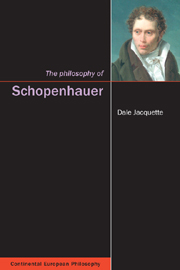Book contents
- Frontmatter
- Contents
- Dedication
- Preface
- Acknowledgements
- A note on texts and terminology
- Abbreviations
- Introduction: Schopenhauer's life and times
- 1 Schopenhauer's idealism
- 2 Empirical knowledge of the world as representation: from natural science to transcendental metaphysics
- 3 Willing and the world as Will
- 4 Suffering, salvation, death, and renunciation of the will to life
- 5 Art and aesthetics of the beautiful and sublime
- 6 Transcendental freedom of Will
- 7 Compassion as the philosophical foundation of morality
- 8 Schopenhauer's legacy in the philosophy of Nietzsche, Heidegger and the early Wittgenstein
- Notes
- Bibliography and recommended reading
- Index
7 - Compassion as the philosophical foundation of morality
- Frontmatter
- Contents
- Dedication
- Preface
- Acknowledgements
- A note on texts and terminology
- Abbreviations
- Introduction: Schopenhauer's life and times
- 1 Schopenhauer's idealism
- 2 Empirical knowledge of the world as representation: from natural science to transcendental metaphysics
- 3 Willing and the world as Will
- 4 Suffering, salvation, death, and renunciation of the will to life
- 5 Art and aesthetics of the beautiful and sublime
- 6 Transcendental freedom of Will
- 7 Compassion as the philosophical foundation of morality
- 8 Schopenhauer's legacy in the philosophy of Nietzsche, Heidegger and the early Wittgenstein
- Notes
- Bibliography and recommended reading
- Index
Summary
Boundless compassion for all living things is the firmest and surest guarantee of pure moral conduct, and needs no causistry. Whoever is inspired with it will assuredly injure no one, will wrong no one, will encroach on no one's rights; on the contrary, he will be lenient and patient with everyone, will forgive everyone, will help everyone as much as he can, and all his actions will bear the stamp of justice, philanthropy, and loving-kindness.
(BM: 172)Origin of morality
Schopenhauer's “Prize Essay”, On the Basis of Morality, in fact won no prize. It was written in response to the Royal Danish Society of Scientific Studies competition, like the Norwegian prize essay contest on freedom of the will, on a topic concerning the psychology of moral reasoning. The essay question contains a lengthy preamble, the main thrust of which is to ask:
Is the source and foundation of morality to be looked for in an idea of morality which lies immediately in consciousness (or conscience), and in the analysis of the other principal notions of morality springing from this, or is it to be sought in another ground of knowledge?
(BM: 38)Critique of Kant's ethics
Schopenhauer begins his essay, following a brief general introduction, with a long section criticizing Kant's moral philosophy, covering roughly half the length of the book. He maintains that, despite being profoundly indebted to Kant's critical idealism, and in particular to the distinction between appearance and thing-in-itself, he is everywhere in disagreement with Kant's ethics and with what Kant calls the groundwork of the metaphysics of morals.
- Type
- Chapter
- Information
- The Philosophy of Schopenhauer , pp. 203 - 233Publisher: Acumen PublishingPrint publication year: 2005

